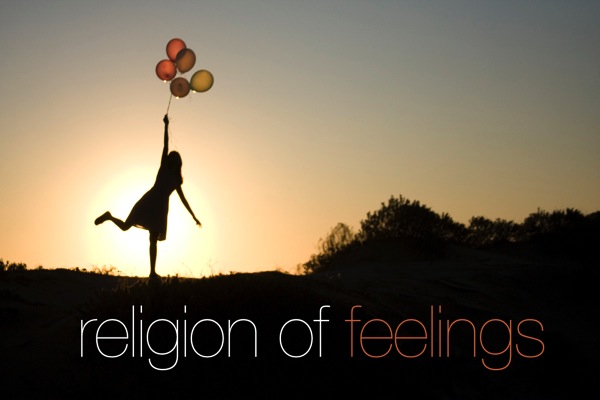 Feelings win in our culture. We do things because of the way it makes us feel. We buy things because of how it makes us feel, and we even believe things simply because of how it makes us feel. We live in a world that wants unicorns and happiness and rainbows. We want the warm, fuzzy feelings. We want everything to make us feel good on the inside. We want everybody to get trophies. We want nobody to lose.
Feelings win in our culture. We do things because of the way it makes us feel. We buy things because of how it makes us feel, and we even believe things simply because of how it makes us feel. We live in a world that wants unicorns and happiness and rainbows. We want the warm, fuzzy feelings. We want everything to make us feel good on the inside. We want everybody to get trophies. We want nobody to lose.
As a culture, we worship at the altar of our own feelings.
Feelings shape so much of how we live our lives. When we go to buy a cup of coffee, we buy overpriced coffee because of the experience. We like the interaction with the employees. We like how the coffee shop feels. We like that they put cute little smiley faces on the cup. And so, we buy the cup of coffee not just because of the taste, but because of the whole experience.
And using our feelings isn’t a bad thing.
When I go to Disney World with my family, the reason I love it is because of the experience that Disney creates. Because when I’m in Disney with my family everything feels magical. My interactions with the employees - from the janitor, to the characters, to the bus boys - are all magical.
Feelings are important and a gift that God has given us. Just like God has given us our mind and our ability to reason, he has also given us our emotions. But while our emotions are incredibly important, especially in our faith, they should not be trusted above everything.
We often believe that if it feels right, it must be right. And if it doesn’t, it must not be right.
While our feelings and experiences are very important, when trusted above God himself, they can become very dangerous.
And we might like to believe that people don’t trust their emotions primarily, but we can see it in the way people talk about their lives. People in their marriages will say, “My marriage just doesn’t feel right, so maybe it’s not right anymore.” Or in talking about their church, “Church just doesn’t feel the way it once felt. Maybe it’s time to just give up.”
Our feelings are a good thing. We should embrace our feelings. We should celebrate our feelings. We should share those feelings. We should be open about those feelings, but we should not trust those feelings above everything.
And so, if you come to church, and you have a certain experience – if you have certain emotions, you should embrace those. You should celebrate those. But you should not trust those.
Because if there hits a season where you don’t feel the way you once felt, where you don’t have the same emotions stirring up, that doesn’t mean that God isn’t working the way he did before, it just means you’re not feeling it the same way.
When you’re marriage is going well, when things are firing on all cylinders, when you’re growing in love and joy, you’re communicating well, and you’re working through issues well - celebrate those feelings. Embrace those feelings. Share those feelings with the people around you.
But when you hit a season where it doesn’t feel that way, what are you gonna trust?
When you hit a season where your marriage feels like it’s more work than joy, when it feels like you should maybe get out, you shouldn’t trust our feelings. Instead, you should trust the objective Word that says, “Although you don’t like your spouse, you need to love your spouse the way Christ loved the Church.”
What happens, when we trust our experiences over something objective, is we believe our feelings and stop trusting in the objective Word of God. As soon as we begin to rely on our emotions and experiences, we have entered into the realm of the mystic. Instead we should embrace our emotions and experiences, but also call them what they are. They are good things, but that are not a higher authority that God and what God has plainly revealed to us.
